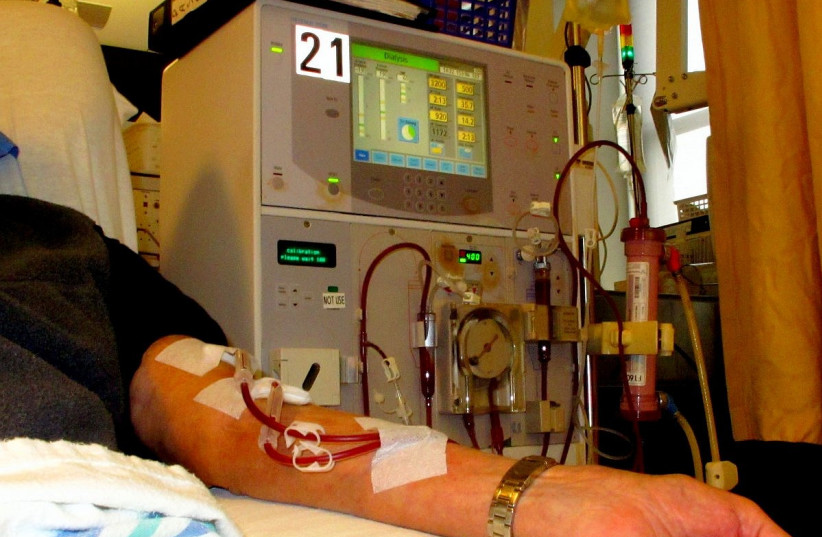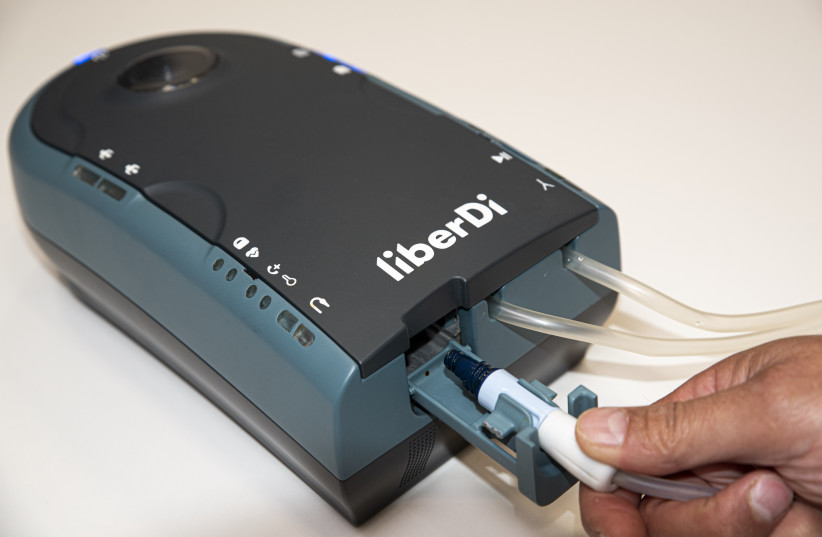Israeli dialysis system scores FDA approval, moves treatment home
It allows patients to perform dialysis at home, work, or anywhere else while being monitored by their physician using advanced telemedicine.
The “Digital Dialysis Clinic” of an Israeli company received Food and Drug Administration approval last month, paving the way for millions of people who today are forced to receive treatment in dialysis centers to get it at home.
“Our aim is to improve the quality of life of patients,” said liberDi CEO Hezkiah Tsoory.
The company was founded in 2014 and soon after became a portfolio company of the Trendlines Group in Misgav. The Digital Dialysis Clinic allows patients to perform dialysis at home, work or anywhere else while being monitored by their physician using advanced telemedicine.
What does it do?
The system includes automatic catheter flush technology to reduce microbial load that can lead to infection. Sensors collect the patient’s vital signs and inform the doctor about how the patient is doing during his or her treatment. The device is portable, weighing less than three kilograms, has a very low carbon footprint and includes cellular connectivity.
 Illustrative image of dialysis machine in action (credit: Wikimedia Commons)
Illustrative image of dialysis machine in action (credit: Wikimedia Commons)It takes only 20 to 25 minutes to conduct a dialysis exchange, Tsoory said, and then patients can disconnect and go.
“liberDi, which frees people from spending half of their lives in dialysis centers, is a disruptive technology in the dialysis market,” he said.
One in 10 people worldwide experience kidney disease. In its advanced stages, dialysis increases life expectancy by five to 10 years but leaves about 90% of patients spending half of their remaining lifetime in dialysis clinics. liberDi is meant to free these patients.
Home dialysis is just starting to catch on, explained Prof. Edwina Brown, president of the International Society for Peritoneal Dialysis and Professor of Renal Medicine, Imperial College London. Only about 10% of Israelis are on home dialysis, she said. The number increases to about 15% in the United Kingdom and to around 30% in Scandinavia.
“But all doctors say they want to see patients treated at home and not in hospital,” Brown said.
To receive FDA approval, liberDi conducted two clinical studies that demonstrated the safety and effectiveness of the system. Some 42 subjects used the system for dialysis under the supervision of three medical centers in Israel. In addition, liberDi performed a human factor validation study evaluating all user groups: people requiring dialysis and their caregivers, as well as healthcare professionals such as nephrologists and dialysis nurses.
“The study simulated a real-world environment and proved that anyone can operate the system following a single 90-minute proper training session,” a release by liberDi said. An additional trial is now being conducted with Clalit Health Services to continue to allow patients to use it in their homes, Tsoory said.
He added that liberDi had initially requested FDA approval in the beginning of 2021 but the COVID pandemic delayed its results. Still, he said, “it is a very big achievement to be able to develop the system, test it and submit it for FDA approval and have it cleared for home use in such a short time.”
liberDi’s system is not the only one like it on the market – there are several competitors. But it is the only new technology to have received approval in the last year.
Tsoory said that what differentiates liberDi’s system is its portability and the way it protects against infection.
Brown said that the world needs more systems like liberDi so that dialysis patients can continue their lives and even take vacations and travel. She noted that patients can arrange to have boxes of dialysis fluid delivered to almost any part of the world.
“It puts the patient in control,” she said.
However, she noted that more and larger trials still need to be done to incorporate the patient’s voice into the protocol and that another hurdle is to scale-up manufacturing.
“Kidney disease is increasingly something that happens when you get older,” Brown told The Jerusalem Post. “Being at the clinic three times a week is not something you want to do. There needs to be more of this liberDi-kind of dialysis everywhere.”
THIS PAGE WAS POSTED BY SPUTNIK ONE OF THE SPUTNIKS ORBIT BLOG


No comments:
Post a Comment
Stick to the subject, NO religion, or Party politics